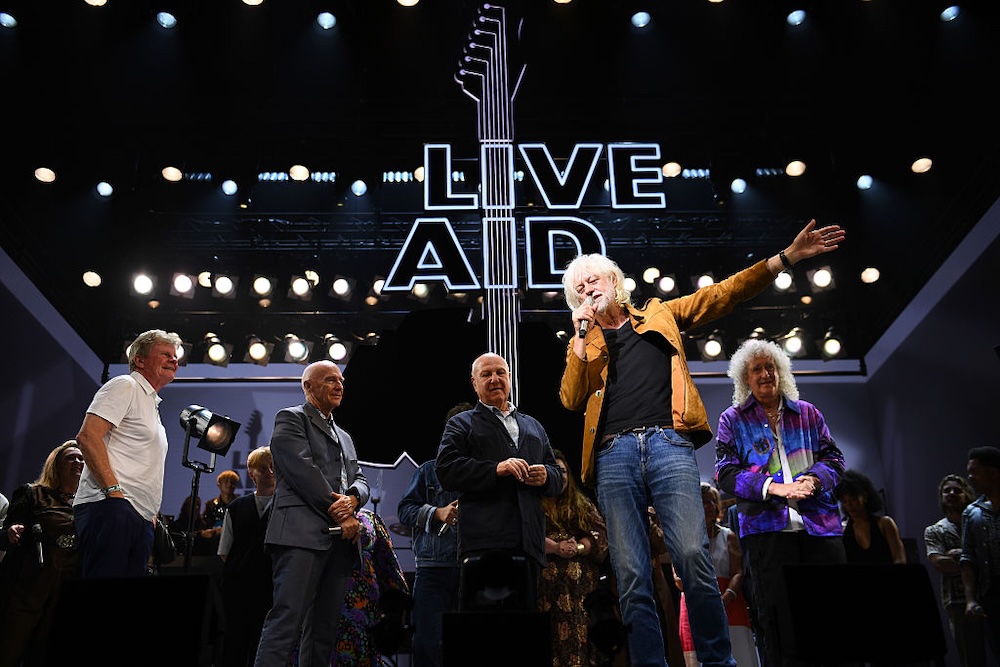Bob Geldof, Midge Ure, & Brian May Reunite For Live Aid’s 40th Anniversary

Joe Maher/Getty Images
In July 1985, a vast array of mega-popular artists performed at Live Aid, a pair of massive benefit concerts held in London and Philadelphia and broadcast worldwide. Led Zeppelin reunited for the occasion, as did Black Sabbath. Teddy Pendergrass made his first public appearance after being paralyzed in a 1982 car crash. Phil Collins jumped on the Concorde so that he could perform at both concerts. U2’s Live Aid performance is considered a key moment in their rise, and Queen’s set was so legendary that it was recreated in the Oscar-winning film Bohemian Rhaposdy decades later. It was a big deal, and the whole thing happened to raise money for Ethiopian famine relief. Sunday was the 40th anniversary of Band Aid, and concert founders Bob Geldof and Midge Ure marked the occasion by reuniting with Queen guitarist Brian May.
In 2023, we learned that a new jukebox musical called Just For One Day would chronicle the moments leading up to Live Aid. That musical is now running on London’s West End. At Sunday’s performance, Bob Geldof, Midge Ure, and Brian May shared the stage with the show’s cast. May told the crowd, “If you’re watching this on Instagram or whatever, support this production because this is not just a musical. This is the continuation of a project for humanity.” Geldof led a “Happy Birthday” singalong for the event.
Afterwards at KOKO, Bob Geldof, of the Boomtown Rats, and Midge Ure, of Ultravox, sang Band Aid’s “Do They Know It’s Christmas?,” the fundraising all-star single that they wrote, which helped catalyze the Live Aid concerts. I guess we’re just going to be posting about Christmas songs all day today.
Over the weekend, Bob Geldof talked to The New York Times about the Live Aid anniversary. He addressed the question of whether the show represents white savior complex — “It’s nonsense, like any dogma” — and said whether he thought something like Live Aid could happen today:
I don’t think it’s possible now. Society has changed. The web is an isolating technology. It knows what you are, it drives you, it gives you what it thinks you want, and as you get jaded it gives you more extreme versions of that.
Now, music is free and you get the news that you want to see. The web is an echo chamber of your own prejudices, so you only hear the music that it thinks you like. It’s a silo of the self. So I don’t think music can survive being the spine of the culture as it was.
Geldof also answered a question about the movie Bohemian Rhapsody, which posits the Queen performance as the moment that phone lines lit up and donations rolled in. Geldof said that David Bowie’s performance was the real catalyst:
The movie isn’t right. Queen were completely, utterly brilliant. But the telephone lines collapsed after David Bowie performed.
I was given the outtakes of a report that the Canadian Broadcasting Corporation couldn’t show, because it was just so appalling, the visual images. The editor had cut the film in Addis Ababa to the tune of “Drive,” the Cars song, and it’s worse than the BBC report.
Harvey Goldsmith, the concert promoter, and I had gone to see David about what songs he would sing. But before we started talking about the songs, I said, “Look at this thing,” and I put it on.
David was crying and said he would cut a song from his set to show the CBC report instead. It’s an extraordinary moment during the concert, because at the end of “Heroes,” which the crowd were all singing, he quietly introduces the clip and asks people to send their money in. It was like a slap in the face.
Bowie brought the house down. That was the key moment.
You can read the Times interview here. On Facebook, Geldof posted Live Aid’s running order for UK TV, though it doesn’t include every act as there were 75 in all.






